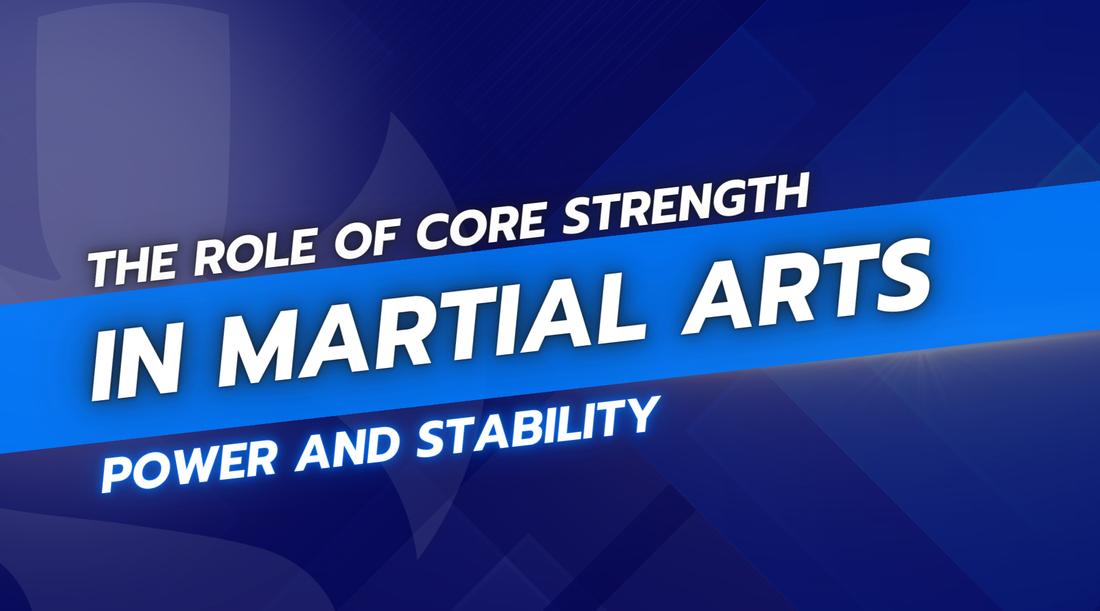
The Role of Core Strength in Martial Arts Power and Stability
Share
When it comes to martial arts, power and stability are paramount. Whether you're throwing a punch, executing a high kick, or defending against an opponent's attack, a strong and stable core is essential. But what exactly is core strength, and how does it play such a crucial role in martial arts? This article delves into the significance of core strength in enhancing martial arts power and stability, offering insights into exercises, techniques, and benefits that can elevate any martial artist's performance.
Understanding Core Strength
Core strength goes beyond having a six-pack. It involves the muscles in your abdomen, lower back, hips, and pelvis. These muscles work together to stabilize your spine and pelvis, providing a solid foundation for movement. Key muscles include the rectus abdominis, transverse abdominis, obliques, and the muscles of the lower back.
Core Strength and Martial Arts Power
The core is the powerhouse of the body, where most martial arts techniques derive their strength. When you throw a punch or a kick, the force originates from your core and transfers through your limbs. A strong core allows for more explosive and powerful movements. For instance, in striking sports like Karate or Muay Thai, the twist of the torso powered by a solid core can significantly enhance the impact of a punch or kick.
Core Strength and Stability in Martial Arts
Stability is another critical aspect of martial arts. Whether you’re moving swiftly to evade an attack or maintaining a solid stance to absorb blows, a strong core is indispensable. Core muscles stabilize your body, helping you maintain balance and control during dynamic movements. This stability is crucial for both offensive and defensive maneuvers, ensuring that you can execute techniques effectively and efficiently.
Key Core Exercises for Martial Artists
To build core strength, martial artists can incorporate a variety of exercises into their training regimen:
- Planks and Variations: Traditional planks, side planks, and dynamic planks engage the entire core, building endurance and strength.
- Russian Twists: This exercise targets the obliques, improving rotational strength crucial for strikes.
- Leg Raises: Leg raises strengthen the lower abs, enhancing stability and control.
- Medicine Ball Exercises: Throws and slams with a medicine ball develop explosive power and core coordination.
Dynamic Core Training for Martial Arts
Incorporating dynamic core exercises can further enhance martial arts performance. Plyometric exercises, such as jump squats and burpees, combine strength and speed, mimicking the explosive movements common in martial arts. Functional movement training, which includes exercises that replicate martial arts techniques, ensures that core strength translates directly to performance in the ring or dojo.
Breathing Techniques and Core Engagement
Proper breathing techniques are vital for maximizing core engagement. Diaphragmatic breathing, where you breathe deeply into your belly, activates the core muscles more effectively than shallow chest breathing. Learning to engage your core while breathing can improve your stamina and power during martial arts practice.
Core Strength in Different Martial Arts Disciplines
Different martial arts disciplines place varying emphasis on core strength:
- Karate: Requires a strong core for powerful strikes and swift, balanced movements.
- Brazilian Jiu-Jitsu: Demands core endurance and stability for grappling and ground fighting.
- Taekwondo: Emphasizes core flexibility and strength for high, fast kicks.
- Muay Thai: Relies on core strength for powerful knees, kicks, and clinching techniques.
Injury Prevention through Core Strength
A strong core also plays a pivotal role in injury prevention. Common martial arts injuries, such as lower back pain and muscle strains, can often be mitigated by having a well-conditioned core. By stabilizing the spine and pelvis, core muscles reduce the risk of overuse injuries and improve overall body mechanics.
Improving Performance through Core Training
Core training can significantly enhance martial arts performance. A strong core improves speed and agility, allowing for quicker, more precise movements. It also increases endurance, enabling martial artists to maintain high levels of performance throughout prolonged training sessions or bouts.
Core Strength and Mental Focus
There's also a profound connection between physical core strength and mental focus. Core training requires concentration and control, fostering a meditative state that can enhance mental clarity. This mental discipline translates to better focus and composure in martial arts practice and competition.
Success Stories: Athletes and Core Strength
Many professional martial artists attribute their success to rigorous core training. Fighters like Conor McGregor and Georges St-Pierre have emphasized the importance of a strong core in interviews and training videos. Their dedication to core strength has undoubtedly contributed to their powerful performances and longevity in the sport.
Common Myths about Core Training
Despite its importance, core training is often misunderstood. One common myth is that endless sit-ups are the key to a strong core. In reality, a variety of exercises targeting all core muscles are necessary for balanced strength. Another misconception is that core training alone will lead to visible abs; diet and overall body fat percentage also play significant roles.
Integrating Core Training into Martial Arts Practice
Integrating core training into your martial arts practice doesn’t have to be complicated. Simple changes, like incorporating a core exercise circuit at the beginning or end of your training session, can make a big difference. It’s also beneficial to include functional core movements that mimic martial arts techniques, ensuring that your core strength is practical and applicable.
Final Thoughts
In martial arts, core strength is the bedrock of power and stability. By focusing on core training, martial artists can enhance their performance, prevent injuries, and achieve greater mental focus. Whether you're a seasoned practitioner or just starting, prioritizing core strength will help you reach new heights in your martial arts journey.
